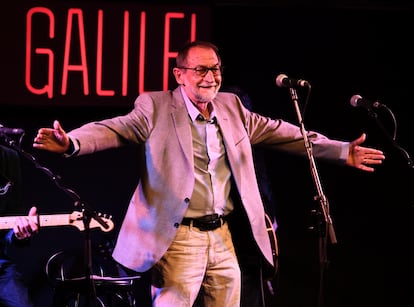The Extremadura singer -songwriter Pablo Guerrero, perhaps the most cleaned exponent of communion between music and poetry, died on Tuesday afternoon at age 78 at the Rúber hospital in Madrid, after a long battle against lung cancer. With Guerrero, one of the most endearing and charismatic figures of the last six decades is left: eternally remembered by the anthem To pitchers (1972) and his live album in the Olympia room in Paris, of 1975, actually leaves a much broader, complex and fascinating legacy that includes a dozen and a half of albums and an extensive poetic work that was always darkened by his charisma as a deep, serene and moving voice singer.
Guerrero, a native of the small Pacense municipality of Esparragosa de Lares and a neighbor for 45 years of the Madrid neighborhood of – could not be otherwise – city of the poets, an ultrasensitive man was endowed with a lucid and advanced vision of a world that always chrotized him, and more since at the beginning of 2021 he sent his inseparable charo. He fought the darkness of depression with unequal success and found his place in the world thanks to an extraordinary ability to capture daily and natural beauty in musical words and phrases. It was an example of evolved masculinity when no one understood any manly model away from manhood; A vulnerable man paradigm capable of reconverting its distress in a dazzling beauty material.
That deep and limpid voice became a paradigm of the best author song in the rales of Franco, although his language was so poetic that censorship never learned well about the messages he slipped. That is why that anthem against the intolerance that was To pitchers (“It has to rain, it has to rain, it has to rain to pitchers”) it became, almost to its spite, an anti -Franco emblem. The success was so unappealable as to bother its author, despite the fact that the relevance of that page eclipsara many others that he considered as inspired and notable. He took him time to reconcile with his most famous creature: it had to be in the funeral of a friend, when the relatives asked him to sing it and he finally understood that this work transcended the author and his circumstances.
Although attached to a classic conception of the singer -songwriter, our bearded and meditabund squires but of admirers and diffusers of the good News of the Pacense. Particularly his album Alas, Alasof 1994, is a prodigious example of that ultrapoothetic song, beautiful and with an even more transgressive sound than that of the two great promises of the time, Pedro Guerra and Javier Álvarez. The latter also became an accomplice and strange couple of Guerrero, until he even recorded an unusual intergenerational experiment to four hands, Guerrero Álvarez (2009), of very claimable content and cover difficult to forget: Javier pilotaba a Vespa while Pablo reputed to the Plaza del Sidecar.
Guerrero’s teachings were filtering in successive generations not in the torrential way of his famous song, but in the form of fine rain. He never conquered great headlines, but the consensus on his poetic, artistic and human greatness ended up acquiring unanimous dimensions. Was evidenced with the tribute album Made of cloudspromoted by Ismael Serrano in 2007 and for which they paraded, with devotional respect, from Luz Casal to Javier Ruibal, Aute, Serrat, Luis Pastor, Labordeta, Víctor Manuel, the mechanical goat, the Extremaduran Acertre and, of course, Javier Álvarez and Suburbano. The years and the nicotine were diminishing the vocal capacity of the artist, but Mendo knew how to squeeze the aroma of his increasingly hoarse and abyssal voice until he became the closest thing to Leonard Cohen that we have met in the Peninsula.
The injuries of the disease began to become evident in the last year, where a weakened and discouraged Paul barely received the visits of his unconditional, from Mendo to the photographer Enrique Cidoncha, author of the images of all his last albums and a man of also epidermal sensitivity, even if they separated almost 40 years from the artist now deceased. Guerrero was never known everything he should, but reread his poems (always written in small notebooks and with a tiny lyrics) is an exercise of hope, despite everything, in the human being. The same one that he expressed, despite all the vicissitudes, when the conversation was extensive, relaxed and deep. “I want to think that we are not just a lot of viscera,” he summed up in his last long -distance interview for this newspaper, in November 2021. Difficult not shuddering to think about that phrase now.

